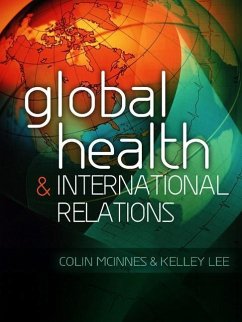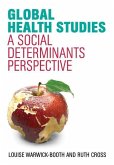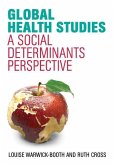The long separation of health and International Relations, as distinct academic fields and policy arenas, has now dramatically changed. Health, concerned with the body, mind and spirit, has traditionally focused on disease and infirmity, whilst International Relations has been dominated by concerns of war, peace and security. Since the 1990s, however, the two fields have increasingly overlapped. How can we explain this shift and what are the implications for the future development of both fields?
Colin McInnes and Kelley Lee examine four key intersections between health and International Relations today - foreign policy and health diplomacy, health and the global political economy, global health governance and global health security. The explosion of interest in these subjects has, in large part, been due to "real world" concerns - disease outbreaks, antibiotic resistance, counterfeit drugs and other risks to human health amid the spread of globalisation. Yet the authors contend that it is also important to understand how global health has been socially constructed, shaped in theory and practice by particular interests and normative frameworks.
This groundbreaking book encourages readers to step back from problem-solving to ask how global health is being problematized in the first place, why certain agendas and issue areas are prioritised, and what determines the potential solutions put forth to address them? The palpable struggle to better understand the health risks facing a globalized world, and to strengthen collective action to deal with them effectively, begins - they argue - with a more reflexive and critical approach to this rapidly emerging subject.
Hinweis: Dieser Artikel kann nur an eine deutsche Lieferadresse ausgeliefert werden.
Colin McInnes and Kelley Lee examine four key intersections between health and International Relations today - foreign policy and health diplomacy, health and the global political economy, global health governance and global health security. The explosion of interest in these subjects has, in large part, been due to "real world" concerns - disease outbreaks, antibiotic resistance, counterfeit drugs and other risks to human health amid the spread of globalisation. Yet the authors contend that it is also important to understand how global health has been socially constructed, shaped in theory and practice by particular interests and normative frameworks.
This groundbreaking book encourages readers to step back from problem-solving to ask how global health is being problematized in the first place, why certain agendas and issue areas are prioritised, and what determines the potential solutions put forth to address them? The palpable struggle to better understand the health risks facing a globalized world, and to strengthen collective action to deal with them effectively, begins - they argue - with a more reflexive and critical approach to this rapidly emerging subject.
Hinweis: Dieser Artikel kann nur an eine deutsche Lieferadresse ausgeliefert werden.
"A brilliant analysis of the intersection of the fields. I strongly recommend this book to academics and professionals working internationally in the field of public health, irrespective of whether they come from a health or an international relations background."
Health Sociology Review
"Deserves a wide readership among scholars of global health and international relations, particularly as it could foster greater inter-disciplinary collaboration between researchers in these fields."
International Affairs
"Colin McInnes and Kelley Lee give us an enormously rich exposition of the modern global health enterprise. Global Health and International Relations must be read, as it offers the most sophisticated and penetrating analysis of global health governance in the literature. I will have their book on my shelf as a critical reference for my scholarship on, and advocacy for, global health with justice."
Lawrence Gostin, Johns Hopkins University
"McInnes and Lee have clearly demonstrated the link between international relations and global health, and in language understood by both target audiences. By doing so, they have brought to life the Oslo Ministerial Declaration of 2007 in which ministers of foreign affairs from seven countries stated that global health is a pressing foreign policy issue."
David L. Heymann, Chatham House Centre on Global Health Security
"It has been clear for many years that the traditionally distinct fields of health studies and international relations needed to be connected in both academic and policy domains. At last, we have a comprehensive engagement connecting these intellectual spaces from two outstanding experts."
Stuart Croft, University of Warwick
Health Sociology Review
"Deserves a wide readership among scholars of global health and international relations, particularly as it could foster greater inter-disciplinary collaboration between researchers in these fields."
International Affairs
"Colin McInnes and Kelley Lee give us an enormously rich exposition of the modern global health enterprise. Global Health and International Relations must be read, as it offers the most sophisticated and penetrating analysis of global health governance in the literature. I will have their book on my shelf as a critical reference for my scholarship on, and advocacy for, global health with justice."
Lawrence Gostin, Johns Hopkins University
"McInnes and Lee have clearly demonstrated the link between international relations and global health, and in language understood by both target audiences. By doing so, they have brought to life the Oslo Ministerial Declaration of 2007 in which ministers of foreign affairs from seven countries stated that global health is a pressing foreign policy issue."
David L. Heymann, Chatham House Centre on Global Health Security
"It has been clear for many years that the traditionally distinct fields of health studies and international relations needed to be connected in both academic and policy domains. At last, we have a comprehensive engagement connecting these intellectual spaces from two outstanding experts."
Stuart Croft, University of Warwick








